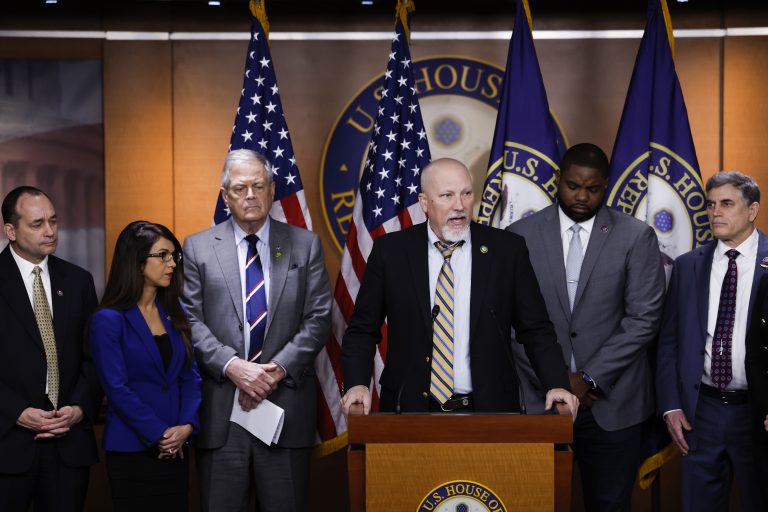The House’s most conservative Republicans and its most liberal Democrats can barely stand each other most days. But lately they’re building an unlikely alliance that could cause real problems for Speaker Kevin McCarthy.
The Donald Trump-aligned Freedom Caucus and the Progressive Caucus are openly uniting in favor of repealing two decades-old war authorizations in Iraq. That’s on top of growing agreement between the two groups’ members in favor of revamping government surveillance powers and curbing defense spending.
“Sometimes the political spectrum is more of a circle than a line. At some point, you might have sometimes-differing motives or different ranges, but you end up [at] the same conclusion, and that’s okay,” said Rep. Chip Roy (R-Texas), a vocal Freedom Caucus member. “That’s kind of how our system works.”
This alignment could create headaches for McCarthy, because he can only lose four members of his own party during any given floor vote in the closely divided House. And while the Senate has already passed its own bipartisan reversal of the Iraq war authorizations, most of the House GOP is not yet bought in on that issue, and there’s no consensus in the party about cutting Pentagon funding.
So if McCarthy’s right flank teams up with liberals in earnest — after nearly costing the California Republican the speakership — it could chip at his hold over his slim majority. It remains to be seen whether a concrete break with the speaker will materialize, but lawmakers on both sides of the aisle are paying attention to the dynamic.
As Rep. Jamaal Bowman (D-N.Y.) put it: “Sometimes you have interesting bedfellows in Washington.”
The best-case scenario outcome for McCarthy, who’s been noncommittal on a quick floor vote to repeal Iraq war powers, is House Foreign Affairs Committee Chair Michael McCaul’s (R-Texas) proposal to replace those war authorizations as well as a third authorization passed after the Sept. 11 attacks. That approach would likely be a no-go for liberals who are currently on the same page as many conservatives.
Ending Iraq war powers “should come to the floor as soon as possible,” said Rep. Barbara Lee (D-Calif.), a former Progressive Caucus co-chair who’s spearheaded a decades-long push on the matter. “And our Republican colleagues are also working to try to ensure that this comes to the floor as soon as possible. It’s way past time to get this done.”
Rebelling against leadership is hardly a new mode for Lee, who endured harsh criticism during the George W. Bush administration as the sole House lawmaker to vote against the post-Sept. 11 authorization. And other members of the Freedom and Progressive Caucuses are gadflies in their own right; Roy, for one, regularly upends the GOP conference’s plans.
“It’s a question of institutional power,” said Rep. Tom Cole (R-Okla.), the House Rules Committee chair whom Lee cited as one of her top Republican allies on repealing war authorizations. “And I think there’s a sense around here, on both the left and the right, that we’ve abdicated too much of that — and not just in recent Congresses, but honestly probably going back decades.”
President Joe Biden has promised to sign the Senate-passed pair of war authorization repeals if they reach his desk.
It’s not just the war powers effort that’s bringing together the House’s opposing factions. They’ve also united to push for pumping the brakes on a potential ban of TikTok, airing fears of government overreach while more establishment colleagues share national security worries.
In addition, Progressive Caucus chief Rep. Pramila Jayapal (D-Wash.) and Freedom Caucus member Rep. Warren Davidson (R-Ohio) are jointly raising concerns about government surveillance laws ahead of a reauthorization deadline at the end of the year.
The left and right frequently align “on issues of war, civil liberties and privacy,” Jayapal said. “We do have things that we see eye to eye on, and I think we’re always going to look for those opportunities.”
It’s not clear yet how the war powers repeal might come to the House floor, whether as a stand-alone or attached to another must-pass vehicle. But Roy said that if it’s not brought up before the end of the year’s annual defense policy bill, he “can promise” it would “become an issue” during debate on that plan.
“We’re gonna have to deal with that at some point. And so this will be just another step along the way. I’ve been happy to work with Congresswoman Lee towards that end,” Roy said.
While McCaul may be able to find a war powers compromise that would satisfy a majority of House Republicans — according to longstanding conference tradition, the speaker needs majority-GOP support in order to bring legislation to the floor — the party probably can’t count on many Democratic votes for that plan.
Right now, liberals are pushing solely for a full repeal of the 2002 and 1991 Iraq authorizations.
“There’s nothing to replace it with,” said Lee. “That argument and strategy is muddying the water.”
Meanwhile, McCaul’s Democratic counterpart atop the Foreign Affairs panel is looking to help break the logjam on post-Sept. 11 war powers. Rep. Gregory Meeks (D-N.Y.) signaled an interest in introducing his own replacement for that measure. But Meeks aligned with progressives on the Senate-passed measures repealing the 2002 and 1991 war powers authorizations, calling for a “straight repeal.”
If all else fails in the war powers debate, there’s always the wonky procedural gambit known as a discharge petition — which allows a majority of House members from either party to band together and force a bill onto the floor, regardless of leadership’s wishes.
Some liberals, like Rep. Ro Khanna (D-Calif.), have indicated they’re open to that option. But other progressive leaders have said that’s off the table for now, concerned it could blow up the fragile bipartisan consensus on war powers.
“The discharge petition is not the way to get bipartisan support,” Lee said. “We have the votes. So this should come to the floor as soon as possible.”



